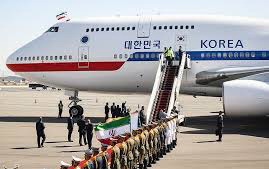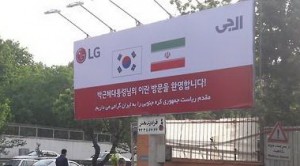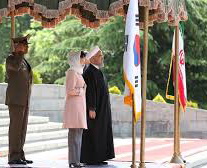
One witness at the scene reports about the late appearance of the South Koran President “Park Geun-Hye“ at the Korean Airline’s Aircraft door and arriving inTehran’s busiest airport (Mehrabad) instead of Imam Khomeini Tehran International Airport.
Though the Iranian journalists had to close their eyes, and the Korean Media team convinced to forget about it at the land of Caviar and hand crafted carpets, however, some Korean media couldn’t resist pointing to the White Scarf of their President. EX: Yonhap’s news lead says: “ Park wore a white headscarf when she was greeted by Iranian officials at Mehrabad International Airport. She received flowers from an Iranian girl, a gesture that South Korean officials say is unprecedented for foreign leaders”
The witness says (without any document) that: “It took hours for the S.Korean President appearance, and it happened after a $3b worth of new deals was added to the previously agreed amount of $ 17b to be signed during President Park’s first visit to Iran after 5 decades of official relations made in 1962.
If the story would have been true then one may ask if that “White Sacrf” really worth $ 3b.

President “Park Geun-hye” arrived in Tehran Sunday for the first time to open new chapter in the two countries’ economic cooperation, especially in the energy sector.
South Korean president’s visit to Tehran is considered the most significant since the establishment of diplomatic ties between the two countries in 1962.
A delegation comprising 236 officials and heads of the biggest companies and industries is accompanying the president in her three-day visit.
During the visit, a number of directors of Korean big companies will sign memorandom of understanding after talks with their Iranian counterparts.
Petroleum Minister Bijan Zangeneh and Korean Minister of Trade, Industry and Energy Chu Hyung-hwan are scheduled to sign a comprehensive MoU in a ceremony in presence of the two presidents.
Boosting Iran’s oil exports to South Korea, investment in LNG, marketing the product and investment in refineries and producing petrochemicals are among the main items of the deal.
Zangeneh said today after a meeting with the Korean Minister of Land, Infrastructure and Transport Kang Ho-in that Iran oil and gas condensates exports to South Korea will grow to 400,000 barrels a day in post-sanctions era.
Another memorandum of understanding will also be signed with South Korean energy minister, the Iranian minister said.
Zangeneh mentioned Iran LNG, development of South Pars 12th Phase and Bahman Geno Refinery in Jask are among the projects of interest for the Koreans.












